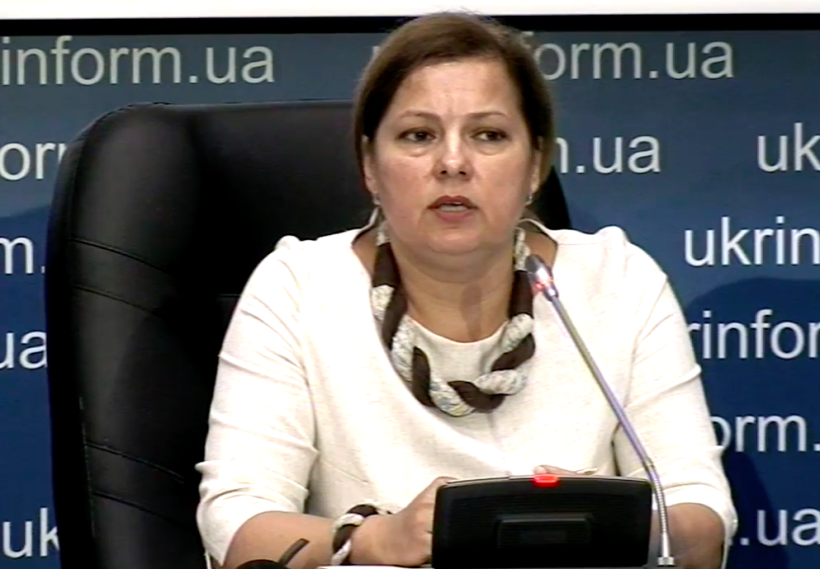Ministry: Simplified procedures available for Donbass school-leavers who have passed External Independent Testing (EIT)

In conjunction with the Open Policy Foundation non-governmental organisation, the Ministry has released a roadmap for applicants from the Donbas (in Ukrainian) which includes an animated video, together with all details for children from the Anti-Terrorist Operation zone applying in 2016, during a press conference on the topic: "Admission to universities in Ukraine for applicants from the Donbass".
"Now the main task is to bring to everybody information about the simplified procedures for applications from the children of Donbass. Admission is not dependent on having a Ukrainian passport or tax registration identification. The National Final Exams can be passed in just a few days and documents of secondary education in the national form can be obtained from the Donbass-Ukraine educational centre, the exams from higher education available to immediately be taken. I want to emphasize that this not only for applying to universities, but also to Technical Colleges, other Colleges and their offshoots", said Iryna Zhdanova, General Manager of the Open Policy Foundation.
She also explained the difference between applications with EIT certificates and the simplified procedure. If a young person receives a EIT certificate, they automatically get the opportunity to apply with this certificate to all higher educational establishments of Ukraine and the world. Under the simplified procedure, applicants from the Donbas may apply only to establishments that are in Russian-controlled Ukraine in the Donetsk and Luhansk region, as well as to those evacuated from the uncontrolled territories.
This mechanism is designed for pragmatic reasons, as offering EIT for children in uncontrolled areas is extremely difficult.
"The Donbass-Ukraine educational centres started work on 1 July. From 1 to 11 July they provided advisory assistance to those persons in the relevant categories. Now the Ministry website has already published a list of authorized establishments on the basis of which the Donbass-Ukraine educational centres were created. There is not only a list of establishments, but also contacts for authorized persons and all additional information", said Svitlana Kretovych, Head of the Department of relocated universities unit at the Ministry.
A Donbass-Ukraine centre may have one of three categories of applicants use its services:
1) applicants with a Ukrainian school-leaver’s certificate and an EIT certificate. They can apply to any educational establishment in Ukraine, in accordance with available procedures. This includes, irrespective of the marks they have achieved, applicants from the Donbass who have passed EIT, although the simplified procedures remain available to them.
2) applicants with Ukrainian national documents – a school-leaver’s certificate or the certificate issued on starting 9th grade- but have not passed EIT. In this case, entry is through the entrance tests listed in the rules of admission to certain higher educational establishments. Under this procedure, entrants can apply to higher education course in the Donetsk and Luhansk region, and the relocated higher educational establishments now based in Kyiv, Vinnytsya, Dnipro, Kriviy Rih and Kharkiv.
3) applicants who have a Ukrainian school-leaver’s certificate and have not gone through EIT. Such applicants need to go to the Donbass-Ukraine centres to take the simplified procedure national final examination and receive appropriate help. The certificate includes all the disciplines that are on the list, the word "certified" appears on the certificate, but for national final certification, they will require two further marks in Ukrainian language and the History of Ukraine. The two marks support the basis for admission to a university, and the average score of the certificate is calculated as the arithmetic mean of these marks. The higher educational establishment itself sets the third exam, in accordance with its own rules of admission. Thus, they make another entrance exam.
"We encourage the educational centres to provide simplified procedures over three days, so that during this duration each applicant is able to go through the whole assessment procedure. These applicants can then go through to the admissions process and, depending on the marks required in the competitive system, they are either eligible for grants or for entry as fee-paying students", added Svitlana Kretovych.
Anyone who can not get a place with a government grant to their chosen university will still have the time and the opportunity to apply to a college, technical college or vocational training school. Acceptance of documents to apply for government grants will be until 27 July, enrollment for places with grants until 6 August, while application and admission for fee-paying places, as well as distance learning, will take place until 20 September.
Iryna Zhdanova added that it is important for applicants from the Donbass to remember that within three months of their successful admission to university, students will still need to receive all the documents that are required for the normal procedure for admission submissions. These include a school-leaver’s certificate, internal identity passport and taxpayer’s registration code. Without a taxpayer’s registration code, students can not get a grant, and in addition, delays in the processing of required documents may be grounds for expulsion.
"The Donbass-Ukraine educational centres are there to help students obtain their documents and help with all the other problems those coming from the Donbass face". With their help, student will get a genuine school-leaver’s certificate instead of some papers and all the necessary advice for getting an internal identity passport (depending on their age) as well as a taxpayer’s registration code", said Svitlana Kretovych.
Further information (in Ukrainian):
Roadmap for Donbass students to receive a Ukrainian education.
Roadmap for Crimean students to receive a Ukrainian education.